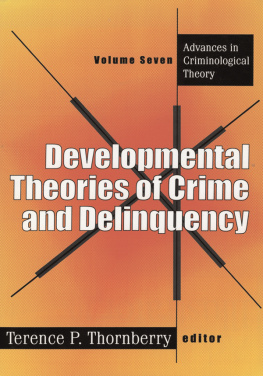Routledge Revivals
Sociological Aspects of Crime and Delinquency
The field of crime and delinquency attracts a great deal of heated and partial opinion, prejudice and other forms of mal-thinking. When there is a scientific approach there tends to be a psychological explanation. This book, first published in 1971, is a corrective to both trends. It is a discussion of criminal behaviour in relation to a wide range of behaviours which could be called deviance and regards the whole field from the sociological point of view. The whole discussion is related to social policy, and is vital reading for students of sociology and criminology.
Sociological Aspects of Crime and Delinquency
Michael Phillipson
First published 1971
by Routledge & Kegan Paul Ltd
This edition first published in 2015 by Routledge
2 Park Square, Milton Park, Abingdon, Oxon OX14 4RN
and by Routledge
711 Third Avenue, New York, NY 10017
Routledge is an imprint of the Taylor & Francis Group, an informa business
1971 Michael Phillipson
The right of Michael Phillipson to be identified as author of this work has been asserted by him in accordance with sections 77 and 78 of the Copyright, Designs and Patents Act 1988.
All rights reserved. No part of this book may be reprinted or reproduced or utilised in any form or by any electronic, mechanical, or other means, now known or hereafter invented, including photocopying and recording, or in any information storage or retrieval system, without permission in writing from the publishers.
Publishers Note
The publisher has gone to great lengths to ensure the quality of this reprint but points out that some imperfections in the original copies may be apparent.
Disclaimer
The publisher has made every effort to trace copyright holders and welcomes correspondence from those they have been unable to contact.
A Library of Congress record exists under LC control number: 71868596
ISBN 13: 978-1-138-83027-1 (hbk)
ISBN 13: 978-1-315-73733-1 (ebk)
ISBN 13: 978-1-138-83031-8 (pbk)
Additional materials are available on the companion website at
[http://www.routledge.com/books/series/Routledge_Revivals]
Sociological Aspects of Crime and Delinquency
by Michael Phillipson
First published 1971
by Routledge and Kegan Paul Ltd
39 Store Street,
London WC1E 2DD and
Newtown Road,
Henley-on-Thames,
Oxon. RG9 1EN
Reprinted 1976
Printed in Great Britain by
Redwood Burn Limited
Trowbridge and Esher
Michael Phillipson 1971
No part of this book may be reproduced in
any form without permission from the
publisher, except for the quotation of
brief passages in criticism
ISBN 0 7100 7082 9 (c)
ISBN 0 7100 7083 7 (p)
Contents
We beg delinquents for our life.
Behind each bush perhaps a knife;
each landscaped crag, ecah flowering shrub
hides a policeman with a club.
Robert Lowell, Central Park,
(Near The Ocean, Faber, 1967)
The sociological study of crime and delinquency raises issues which are of general importance to the discipline of sociology. These issues concern the kinds of questions which sociologists ask, the kinds of methods of investigation they use and the kinds of explanations or interpretations which they offer. One issue in particular is well illustrated by the sociological analysis of crime, and it is an issue which underlies the main arguments of this book. The fact that crime is viewed as an important social problem by some members of society raises the complex issue of the nature of the relationship between sociological knowledge and problems and those things defined as social problems by the members of society in their everyday practical thinking. Can a distinction be made between sociological problems and social problems? If so, what is the relationship between the two? An underlying theme of this book is that such a distinction can and should be made and that making it has direct implications for the questions sociologists ask about the phenomenon of crime. The discussion rests, to a great extent, on the contrast which is drawn between traditional criminology and the contemporary sociological study of crime and delinquency. This comparison illustrates both the peculiar difficulties involved in the social scientific analysis of crime and also some of the ways in which the social sciences have tried to justify their claims to scientific status.
Criminology is an unusual discipline. It is the only human science which expressly takes as its subject matter a social and political problem. All the other disciplines take behaviour in general as their subject matter and select out a given level for intensive investigation. Criminology does not focus on one level of behaviour but nevertheless attempts to provide explanations of particular forms of behaviour, namely, criminal actions; as its subject matter is limited to highly particular forms of socially defined behaviour (crime), its theories and its methods are forced into the position of having to apply every level of analysis (chemical, physiological, psychological and sociological) to the phenomena which it is trying to understand. There are many problems which stem from this approach and which make the validity of criminological explanations difficult to accept. Because criminologists are often aware of the difficulties of validating their claims to provide explanations, they have to develop a rationale and justification for their activities; such a rationale has to be more than simply the interest in the drama of crime which they share with many other members of society. The criminological rationale is provided by the fact that crime in industrial societies is defined as a serious social and political problem, and the hope is that analysis of this social problem by criminologists could lead to more effective ways of dealing with it. However, the way that this rationale has been interpreted in traditional criminology raises crucial questions about its pretensions to certain kinds of objectivity and about its viability as an independent discipline. In this chapter, the most fundamental of the analytical problems which face criminology are discussed briefly as a prolegomenon to the presentation of an alternative sociological perspective for the analysis of crime.
From a sociological perspective the short history of criminology has been a history of failure, and it is a failure to which sociologists themselves have made a considerable contribution. An understanding of this failure requires a critique of the kinds of questions asked by criminologists, the ways in which they try to answer them and the assumptions upon which criminology rests. Criminology, like other scientific disciplines, makes claims to objectivity, and yet it differs in one crucial respect from the other sciences: it is probably the only discipline whose subject matter is defined not by its own intrinsic qualities but by society at large and by those groups with authority in particular.
The scientist, whether natural or social, normally has the freedom to create and define his own terms, such definitions in themselves limiting his field of study. His definitions may undergo constant change in a rapidly developing science, but the changes arise out of the scientists theories and research and not by external fiat; certainly particular interest groups in society, such as industrial or governmental, do attempt to control the direction of scientific research, but they cannot define its limiting concepts. Thus, while the area of the scientists research can always be viewed as the product of the interplay of a range of values (stemming from the scientist himself, the scientific community, industry and government), during the course of his research the scientists questions arise from the interests of his particular discipline and the nature of the phenomena with which it is concerned. His choice of certain styles of theories, concepts and methods, which actually define the limits of his studies, arises out of the concerns of the discipline and the criteria used within it to evaluate his work.






